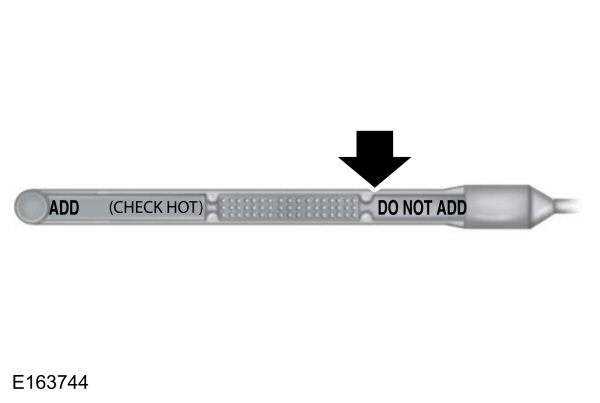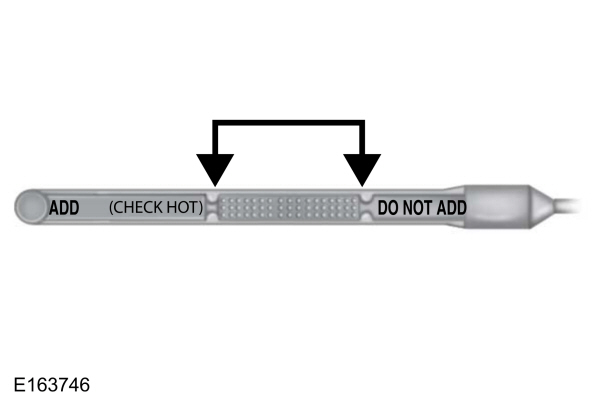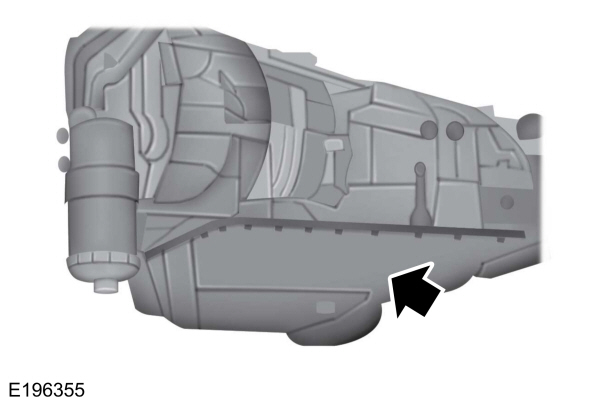This view of the Owner’s Manual contains the very latest information, which may vary slightly from the printed Owner’s Manual originally provided with your vehicle. It may also describe content that is not on or operates differently on your vehicle. Please consider the Owner’s Manual originally provided with your vehicle as the primary source of information for your vehicle.

The information contained in this publication was correct at the time of release.In the interest of continuous development, we reserve the right to change specifications, design or equipment at any time without notice or obligation.No part of this publication may be reproduced, transmitted, stored in a retrieval system or translated into any language in any form by any means without our written permission.Errors and omissions excepted.
Copyright © 2024 Ford Motor Company
Automatic Transmission Fluid Check





Have an authorized dealer check and change the transmission fluid and filter at the correct service interval. See
Scheduled Maintenance.
Do not use supplemental transmission fluid additives, treatments or cleaning agents. The use of these materials may affect transmission operation and result in damage to internal transmission components.
Checking Automatic Transmission Fluid
For scheduled intervals of the fluid checks and changes, See
Scheduled Maintenance.
Your transmission does not consume fluid. However, if the transmission is not working properly, for example, if the transmission slips or shifts slowly, or if you notice some sign of fluid leakage, check the fluid level as soon as possible.
Automatic transmission fluid expands when warmed. Obtain an accurate reading as follows :
- Drive the vehicle approximately 19 mi (30 km) to reach normal operating temperature via the transmission fluid temperature gauge on the instrument cluster.
- Park the vehicle on a level surface and engage the parking brake.
- With the engine running, parking brake engaged and your foot on the brake pedal, move the gearshift lever through all of the gear ranges. Allow sufficient time for each gear to engage.
- Put the transmission in park (P) and leave the engine running.
- Remove the dipstick, wiping it clean with a clean, dry, lint free rag.
- Install the dipstick, fully seating it in the filler tube.
- Remove the dipstick and inspect the fluid level. The fluid should be in the designated area for normal operating temperature.
Low Fluid Level

Do not drive the vehicle if there is no indication of fluid on the dipstick and the ambient temperature is above
50 °F (10 °C).
Correct Fluid Level

Drive the vehicle
19 mi (30 km) or until it reaches normal operating temperature. Check the fluid at the normal operating temperature of
196 °F (91 °C) to
215 °F (102 °C) on a level surface.
High Fluid Level

Fluid levels above the safe range may result in transmission failure. An overfill condition of transmission fluid may cause shift and engagement concerns, and possible damage.
An overheating condition can cause high fluid levels.
Adjusting Automatic Transmission Fluid Levels
Note:
Use of a non-approved automatic transmission fluid may cause internal transmission component damage.
Make sure to use the correct type of fluid. You can find the type of fluid used on the transmission dipstick, or in your Owner's Manual. See
Capacities and Specifications.
If necessary, add fluid in
8 fl oz (250 ml) increments through the filler tube until the level is correct.

If an overfill occurs, have a qualified technician remove excess fluid.
Note:
An overfill condition of transmission fluid may cause shift and engagement concerns, and possible damage.
Do not use supplemental transmission fluid additives, treatments or cleaning agents. The use of these materials may affect transmission operation and result in damage to internal transmission components.
Automatic Transmission Fluid Filter

Your automatic transmission has a serviceable transmission fluid filter inside the transmission bottom pan. For service intervals for the automatic transmission fluid and transmission filter, See
Scheduled Maintenance.
For transmission filter maintenance, see your authorized dealer.
Thank You For Your Feedback
